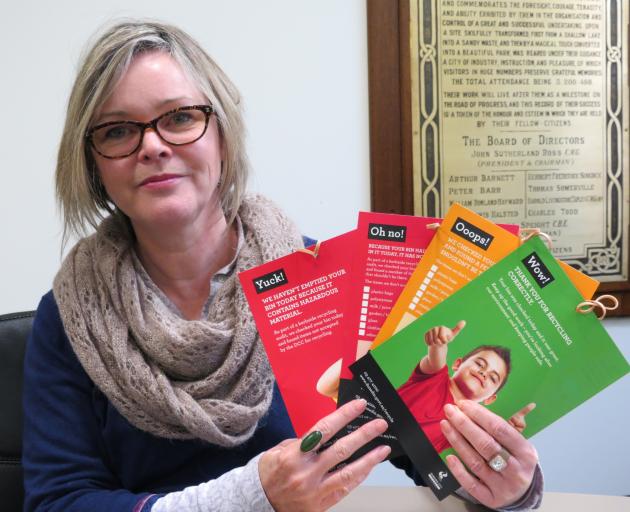
Even the most dedicated recyclers can sometimes get it wrong.
So for the next three months, Dunedin City Council staff will be inspecting recycling bins across the city.
DCC solid waste manager Catherine Irvine said rates of contamination in the city's recycling had been among the best in the country, at only 5.7%, but had risen in the past few years to 11%.
``Dunedin people have always been good recyclers, but we have seen contamination rates go up over a six-year period.''
The amount of contaminants going into the recycling stream was costing the city about $80,000 a year, she said.
Contaminants in the yellow-topped recycling bins could range from common mistakes, such as plastic bags or juice cartons, through to health hazards such as used nappies and used syringes.
``I think perhaps people don't realise that our recyclables are handled by people at the sorting facility,
so we want to keep them safe, and to reduce the amount of recycling that has to go to landfill due to contamination.''
Two staff started bin inspections on Monday, randomly selecting streets on the collection truck's route and examining every bin in those streets.
Depending on what was found, the bins would be tagged with one of four colour-coded cards, Ms Irvine said.
Green meant ``Wow!'' and congratulated householders on getting it right, while orange meant ``Oops!'' and noted a small amount of incorrect recycling.
There were two types of red tags - an ``Oh No!'' tag, which denoted that householders were using their recycling bin as a rubbish bin, and a ``Yuck!'' tag indicating hazardous material such as dead animals, hypodermic needles or even gas bottles.
Bins containing these types of contaminants would not be collected, as they would contaminate a whole truckload and would put sorters at risk.
If this ``very small number'' of people did not comply with instructions, bins could be removed, Ms Irvine said.
``So far, the orange tags are proving the most common, which shows that people are making a genuine attempt to recycle, but just need some guidance,'' she said.
BRENDA.HARWOOD @thestar.co.nz












